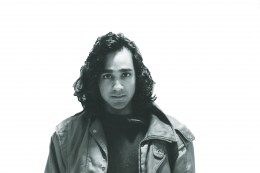
I got really angry last week. Angrier than I’ve been in a long time. It came when I counted 16 Israeli flags waving for “Israel Peace Week” in the New University Union.
My anger caused me to ask a simple question: How can you wave 16 Israeli flags in the name of peace, but not a single Palestinian flag? How can you negotiate peace between two countries while trying to pretend that one of them doesn’t exist? The Israel Peace Week that I saw, that many students saw, was not about peace. It was about trying to convince people that Israel isn’t wrong and has never done anything wrong.
So, for one hour last Friday, I held up a small homemade Palestinian flag outside of the campus event Shabbat 1500.
The experience was transformative in a way I didn’t expect. I went to the Events Center with a dissonant mission, a series of echoing emotions in my heart, memories of seeing olive trees burn, old men being spit on, teaching 18-year-old students who had just returned from childhoods spent in prison and exile.
But when I held up my flag and people started calling me “faggot” and “homo” and “dipshit” and “jackass” and “terrorist,” I remembered an obvious lesson that I’d forgotten since I’ve been back from Palestine: Anger is destructive.
Holding up my small flag, my anger disappeared — all that was left was a complete desire for there to be, for just one hour, a Palestinian flag on campus where I thought lots of young Jewish people would see it.
Holding up my small flag, my heart was light, and I heard two arguments that I’d like to respond to here.
1. “You are being disrespectful. This is a Jewish event, and the flag you’re holding has nothing to do with Israel.”
This is an idea I have heard many, many times before. My response is that treating Israel, Palestine, Islam, Judaism and Christianity as separable in the conflict is a red herring and is a means of disempowering the conversation about the conflict by accusing the participants of being racist. My reason for being at Shabbat 1500 was not to stop people celebrating their religion, but to share my very person, my experiences, with people I predicted haven’t seen what I have seen. My action came out of confusion and anger, but once I saw those things reflected back at me, I saw how destructive they really are. I saw how easy it is to lose sight of the other people involved in the conflict because of the ideologies we’re taught. I held up a flag to air out a part of my life that I love.
2. “You hurt the cause of Palestine because people will see you here and conflate pro-Palestine with anti-semitic.”
I heard this a lot. It took me a while to make sense of it. This is an admission of guilt. The problem in the conflict is that both sides look to the actions of individuals and, without talking to those individuals, use what they see as evidence for what they already believe. My message was not anti-semitic. My message was a personal testament to the beautiful memories I have of Palestine I wanted to share. That so many people saw my action as hateful or angry says nothing about me or Palestine, but a great deal about some people in the Jewish community’s tendency to see every action about peace in the Middle East as an attack on them personally.
It’s this latter point that I, personally, believe to be the greatest obstacle to peace. Both sides need to stop disengaging from dialogue and hiding behind what they already believe. We need to start seeing people who bear flags as opportunities to bring us all closer, not to push us all further apart.
– Raghav Goyal is a senior majoring in biology


